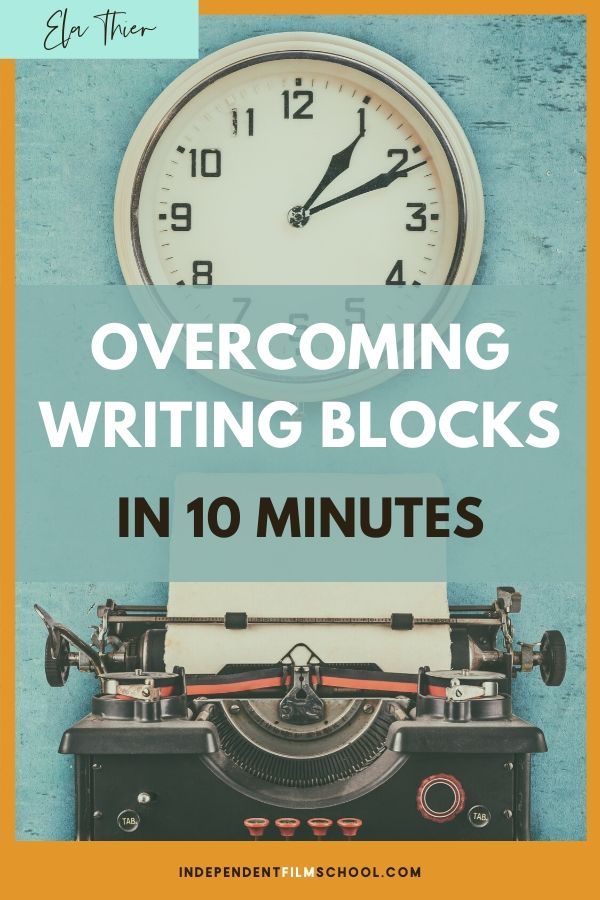
YOU’RE NOT ALONE!
Everyone suffers from writing blocks, but most don’t know it. They mostly feel like they just “don’t feel like writing” or feel too busy. If you’re aware of the fact that you’re blocked, you are way ahead of the curve because you’re likely to seek solutions, and the solutions are definitely out there.
The people in the photo below were asked: “Who here isn’t writing as often as they’d like to be?”
I ask this question every time I meet with a group of writers, and whether it’s a group of three or a group of three hundred, the results are always the same: Almost every person raises their hand. Including myself!
It’s not your fault that you’re blocked at times. You’re not lazy. You’re not a procrastinator. We live in a society that doesn’t encourage creativity, and where criticizing, invalidation, and even mocking people’s creative efforts is A-okay. We’ve built an entire profession around this habit.
We’re each the survivor of thousands of hours of having been invalidated, or watched others be invalidated, which is just as scary and upsetting. So yeah… of course we’re blocked. Who wouldn’t be.
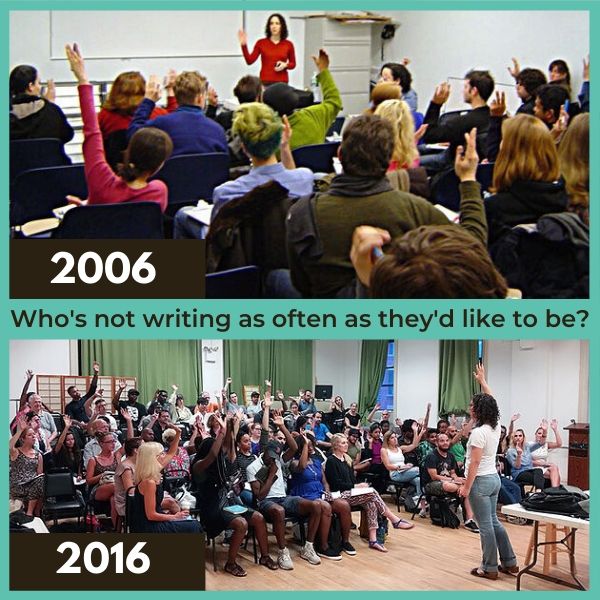
OVERCOMING WRITING BLOCKS IS EVERY WRITER’S BUSINESS.
Many scientists have theorized that the average well-functioning adult has access to roughly ten percent of their full intelligence. Can you image what you would write and how often if you had full access to all of your intelligence? Roll over Shakespeare. Here comes [insert your name here].
Overcoming writing blocks is an ongoing practice that I recommend tending to at regular intervals throughout your career, no matter how advanced you are. Whether you’ve never written a word or you’re a hardened veteran, on occasion you’ve got to go back to square one and reconnect with what it’s like to play for the fun of it and not focus on results. It’s what will lead you to your freshest and most authentic (and therefore most unique and compelling) work.
OVERCOMING WRITING BLOCKS IS A LIFELONG PRACTICE. AND – YOU CAN END IT IN 10 MINUTES. BOTH ARE TRUE.
By the time you’re done reading this article, if you follow my instructions, your writing life will drastically change. So let’s get to it!
THE REASON WE DON’T WRITE IS BECAUSE WE SET OUT TO WRITE WELL.
No professional writer sets out to write well. Certainly no prolific writer puts any stock in writing well. We know that writing well is not our job. Our job is to write.
WRITING WELL IS EASY. WRITING BADLY IS DIFFICULT AND COURAGEOUS.
The fingers are racing, the keyboard’s on fire, your eyes fill with tears, you’re laughing out loud, you’re in love with your characters and every witty and perfect thing that comes out of their mouth – that’s what happens when you’re writing well.
For a few moments of grace you’re thinking: wow, I’m good.
Writing badly, on the other hand, is exceedingly difficult. The dialogue is contrived, you have no beat on the characters, you don’t know what the story is about, every word is pain.
If you can keep writing when you’re writing badly, you have a shot at becoming a pro.
THE DIFFERENCE BETWEEN A PROFESSIONAL WRITER AND A WANNABE IS THE WILLINGNESS TO WRITE BADLY.
If you refuse to write unless you’re writing well, you probably haven’t been writing in a while. Perhaps a long while. Perhaps ever.
The professional writer knows that if you continue to write through a writing block, if you continue to write when you write badly, the magic eventually happens.
Writing is like anything else in life: the more you do it, the better you get at it. So when we set out to write brilliantly from the get-go, we’ve set ourselves up for failure.
Write badly, then write badly some more, than write badly a whole lot longer, and eventually your heart will open, you’ll stop trying to control the work, you’ll find yourself taking dictation, and whether you’re writing a memoir or a sci fi about iguanas in space, the most authentic and personal stuff will show up. You will find your voice.
What is free writing: the how
When you free write, keep putting words on the page no. matter. what.
It’s hot in here. It’s cold in here. I don’t know what to write. I forgot my cousin’s birthday. I’ll post something belated on her facebook page. Can’t believe I forgot it. I don’t want to be writing. And on and on and on.
You can’t do it wrong. The only thing you can do wrong when you free write is to stop and “think” about what you’re going to write. That’s the path to Candy Crush.
I put “think” in quotes because what we consider “thinking” is usually just worrying, second-guessing, straining, and getting in our own way. What we need to be doing instead is letting the words fall out to the page and discover what’s going to come out rather than try and control it.
I write all my films as a free write. Once while feeling stuck as I wrote a feature, I free wrote about the feature and accidentally ended up with a short script about trying to write the script. I then filmed it exactly as I wrote it.
The film captures this process of letting your mind wander freely and letting it lead you rather than trying to bend it to your will.
The film is called Bad Writing. I recommend! 🙂
To free write, use a timer and set it to anywhere between 10 and 30 minutes.
If you haven’t been writing, or haven’t written in a long time, start with 10 minute blocks of time. If you’re finding that the idea of free writing is remaining an idea only and you’re not actually trying it out, then make it 3 minutes.
Anyone can write for just 3 minutes. You certainly can.
If you’re an experienced writer, a 30-minute free write is my recommendation. It gives you enough time to blab on, relax on the page, find your stride, and then sequi into writing an actual scene start to finish. If you’re an experienced writer, allow yourself up to 10 minutes of rambling before you segui into writing a scene. We all need to stretch before we run.
All that said, stay flexible on how long you write: Some days, after just a sentence or two of blah-di-blah, you’ll find yourself diving straight into a juicy scene. Some days blah-di-blah is all that’s coming out. It’s all good.
When the timer goes off you can stop writing, catch your breath and pat yourself on the back. You’ve done your writing work for the day. Really.
If you’re majorly in the zone and the script is writing itself, when the timer goes off just shut it down and stay in the zone and keep writing. No one can stop you now!
Oops! Found yourself playing Angry Birds even though you were in the zone a minute ago?
Take five and then set your timer again to another 30 minutes.
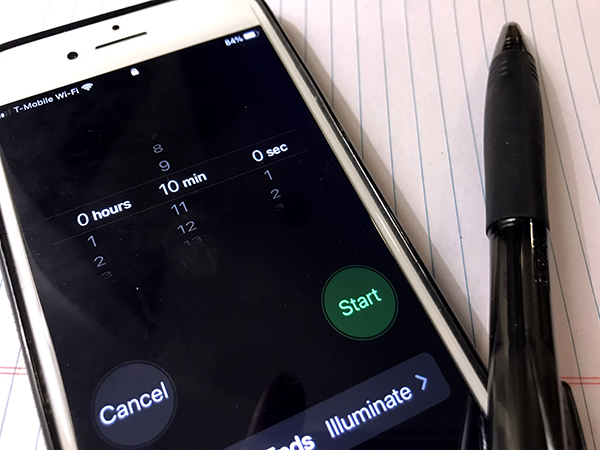
Don’t stop putting words on the page until the timer goes off!
Put words on the page, put words on the page, put words on the page, put words on the page. If you have no idea what to write, just write that. I don’t know what to write, I don’t know what to write, I don’t know what to write, I don’t know what to write. If you do that for 10 minutes, you’ve aced the assignment.
Shh…. No distractions.
Create the environment you’d need if you were going to sleep
Set your phone to airplane mode. Turn wifi off on your computer. If you’re using a software that requires you be online, use a productivity tool like SelfControl or its equivalent. (I’m not affiliated, just letting you know what I use.)
Consider using pen and paper. No Computers.
The computer makes everything look like a final draft, which leads us to edit when we should be writing. So a lot of people find that pen to paper is the way to go. Pen to paper gives you the room to make messes and scribble – literally!
Don’t concern yourself with screenplay format while you’re free writing. Sure, you want to stick to actions and words if you’re writing a scene (as opposed to prose), but don’t worry about margins and what not.
I free wrote pen to paper for many years before I found myself able to free write on the computer
Your treadmill: The Most Dangerous Writing App
If you’re doing your free writing on a computer, try using The Most Dangerous Writing App. (It’s free and I’m not affiliated; just a personal recommendation.)
When you use this app, you choose how long you’d like to be writing and then once you hit “start,” you have to keep typing no matter what. If you stop for more than 5 seconds, the app will delete what you wrote (eek!)
If the idea of the app gives you heart palpitations I’m here to tell you: it’s all good. After it deletes your writing once or twice because you stopped to ponder, it’ll never happen again. You’ll get practiced at putting words on the page without overthinking and editing.
Don’t share your free writes.
It would be a grave mistake to share your free writes. If you’re doing them well, then they’re unreadable (and boring!) nonsense. Don’t even go back to read them yourself.
If, while free writing, you find yourself writing a scene you like that you plan to use (happy accidents do happen), mark it in some way by putting a star next to that section or some equivalent, so you can go back later for a cut-and-paste-job.
Before I continue, quick word from the sponsors (that’d be me…) I invite you to check out the courtesy trainings that I offer my members.
Free writing: the why
The ability to let writing flow without judgement is a practice.
Free writing – the act of resting on the page rather than straining and working hard – is a muscle that you can build. After you try it out just once or twice, even for 3 to 10 minutes, it’ll feel doable. You’ll find yourself looking forward to your morning runs.
Once you do it regularly for a while, it’ll become second nature.
The ability to let the words fall onto the page without you trying to control them is the secret recipe to:
A) Overcoming writing blocks.
B) Writing your best and freshest material by allowing it to find you, rather than getting in your own way by editing when you need to be writing.
Say this ten times: Thinking about writing doesn’t lead to writing. Only writing leads to writing.
Most of us make the mistake of thinking that writing is what happens after you’ve done some thinking. You gaze out a window, scratch your chin, furrow your brow, have deep thoughts, and when the perfect idea shows up you commit it to paper: perfectly! If you’re a real writer, that idea will come and the first thing you write will be brilliant.
Ugh.
Nothing is further from the truth.
The gaze-out-the-window approach to writing usually leads to checking emails, checking the fridge, watching another episode of [insert whatever you’re binge watching right now in here], or playing Candy Crush (Two Dots in my case!)
Only the actual act of writing leads to actually writing. And only writing can lead to more writing.
Listen my friend, I don’t care how brilliant you are, know this:
Writing is like plumbing. The more you do it the better you get at it.
Your best ideas will show up when you let yourself write badly.
If you allow yourself to “write badly,” if you push to just put words on the page no matter what, ideas will come to you that wouldn’t show up any other way. These ideas won’t come as you gaze out the window, furrow your brow and then check for another snack.
Your ideas, in fact, most of your best ideas, in fact, most of your ideas altogether, will show up on the page while you’re writing. Don’t kill the messenger.
Free writing is the key to overcoming writing blocks because forcing yourself to put words on the page no matter what tricks you of getting distracted by the mistaken goal of writing well.
Don’t write well. Just write.
Free writing: the when
Yes, mornings are best. I find they’re best for everyone, even the diehard “night people.”
But more importantly, consistency is king. It’s queen too.
The difference between writing for 10 minutes and not writing, is the difference between being a writer and not being a writer.
I once had an athletic roommate who swam laps at a near Olympic-record speed. I asked him to give me advice on getting in shape. He told me that the difference between someone who does nothing and someone who walks 10 minutes a day, is much greater than the difference between someone who walks 10 minutes a day and an Olympic athlete.
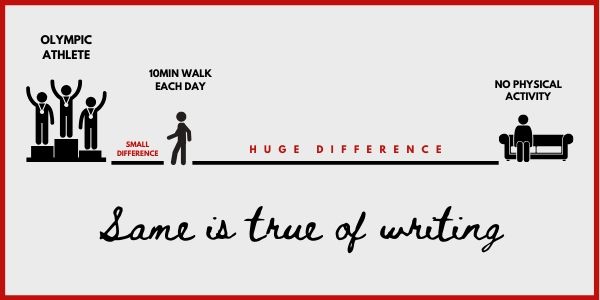
Same is true of writing! The difference between writing 10 minutes a day and a professional writer is not that big. But the difference between 10 minutes and nothing is the difference between being a writer and someone who thinks about being a writer.
I use free writing at every stage of the writing process.
Whether I’m generating story ideas, writing a first draft, smoothing out a last little kink in a final polish, writing a pitch or a query letter: I begin with free write. The editing comes later.
Even outlining can’t really happen without free writing. Outlining is an editing process not a writing process. Once you’ve free written your heart out, then you look back at what you have and shape it into some sort of an outline.
By the way: this article was a free write.
This article was a few different free writes. I then used editing skills to put the pieces together, organize and streamline. The free writes are the raw materials that the writer then uses to create with.
Join my free membership for my courtesy trainings for writers and filmmakers where I get into the weeds on story structure and the revision process.
Why wait, right? No good reason.
Use me for accountability.
In the comments below, let me know when you’ll do your next free write and for how long.
10 minutes is great. 3 minutes good too. No more than 30.
“Right now!” is a great answer. Now that you read this article, why don’t you head over to The Most Dangerous Writing App, set it to however many minutes, and try it out!
If not right now, be sure to make an appointment and then honor it like you would any other appointment.
If you’re convinced you’re too damn busy, make an appointment to free write for 3 minutes. Can you for real argue with that…?
Once you’ve written, leave a reply on your own comment to let me and the rest of us know that you’ve kept your appointment and report on how it went 🙂
Happy writing!

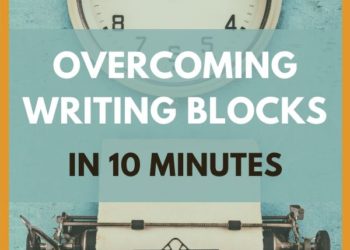
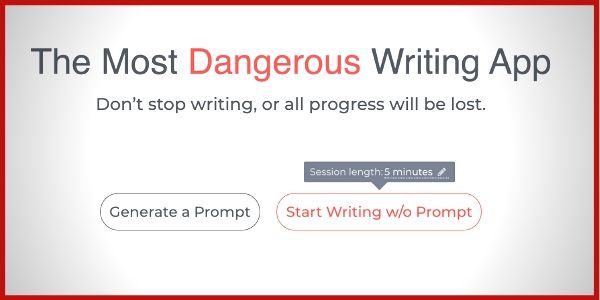
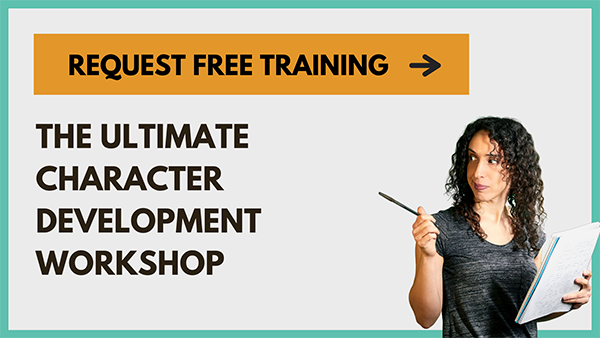
e: sooo what happens to what you wrote using themostdangerouswritingap once you succeed in going the distance? is is stored somewhere, or do you have to cut/paste into your own document?
It lets you download it as a word doc, txt doc, or a PDF. Or you can cut and paste. Good question! 🙂
Thank you so much ma’am Ella
Well I got 860 words out of that-it was soooooo scary first and then the words just kept coming-amazing that they are just waiting for invitation and opportunity-yaaaay!
Great exercise!
Thank you
I have been freewriting for years, although not consistantly. Some of my best work has come from it.
how to become a member ?
Click that orange button above Shieni. Here’s the direct link: https://thierpro.wpengine.com/online-film-school-free-trainings. (Shieni, I just looked you up and see that you’ve been a member since Jan 2019, but it’s also showing that you don’t open my emails. I might be getting lost in your spam, promo or updates tab. Search for emails from “Ela Thier” to find my emails, and when you find the last one that I sent, drag it to your inbox and indicate that my emails should go there.) Thanks for your interest!
Ela! This is exactly what I needed to read — THANK YOU. Excited for your training course on Thursday!! I shall quickly stuff my face with food and commence 30mins of free writing! Be right back to let you know how it went…
Ha ha!!! Love it Heidi. See you Thursday! Remember to take it easy… If you haven’t written in a while, 10 minutes is a great place to start 🙂
I’ll be free writing after each run to get in the habit. Throughout college at an NCAA Div. 1 track and field program we had 2 a days and it does help.
Q: I have profound hearing loss. I can hear the videos but miss many words. So I’m often in the habit of having to ask if Vimeo users could consider Rev.com to [CC] caption their videos. YouTube is free when you reach 1k subscribers (I’ve helped sometimes).
Thanks for sharing Robert! And yes, I use rev and add captions to all of the videos on my site, so I’m really surprised this one has indeed been missing them! Thank you for alerting me; getting on it asap!
I will start free writing in the mornings before I speak to anyone. Or scroll on social media
yesssss. Or as my 1-year-old niece would put it: hurray!!! Make it your goal to do that for just 6 days. If you don’t put a time limit, you may fall off the wagon after day 1 or 2. But if you know that you’ll do that for just 6 days, you’ll push yourself. After 6 days, re-evaluate. Maybe another 6 days? One tiny step at a time and you’ll get big and strong! 🙂
Ela:
Just finished the 10 minute free writing task. Whew. 10 minutes is a long time. I wrote in the form of a letter I was mailing to someone. It felt good to just let go. My hand hurts a little. I wrote in a quiet space. Just the hum of the fan next to my bed was the only voice in the room. I often should one do these tasks?
congrats! Start by committing to doing a 10-min freewrite every day for the next 6 days. After 6-day decide on the next 6 days and so forth. Doing this daily for just one week will lead to substantial moves forward. Enjoy! 🙂
Ok I’m going to give it a whack! Pen to paper. Right now.
yes!
Right now
I’ve just finished a 10 min session on the most dangerous app. It was super fun and honestly relieving to watch my gobbily-goop of horrid sausage finger brain garble just slowly fade away into nothingness… therapeutic even.
Mahalo nui loa Ela for offering your knowledge and creative resources.
wow I just did dangerous writing exercise. What a fantastic idea.
The video is deadpan and hilarious and so true.
Free write tomorrow AM 5 PM. I’m up every morning at that time for an hour or 2. Then back to bed to get my 7 hours. Usually waste that time with internet. NOOOO more.
Ela, I’m so happy to discover you and Dave Trottier tonight. I’ve immersed myself in the resources you’ve made available. I’m currently in the middle of a direct mail campaign intended to promote my brother’s second fictional novel. My letter starts with a book review (written by a professional blogger) and concludes with instructions to download a free six chapter sample from the kindle store. The letters are going out to screenwriters, actors, directors and celebrities with a plea to finance a successful screenwriter’s fee. Does this approach even work? Neither my brother nor I have the financial means to hire a successful screenwriter but we believe both of his novels will be successful motion pictures. My “Plan B” was to become a screenwriter and take a more active role in this project.
Great Article! Do you think writing software worth it?
I will free write again, on a roll
Thank-you Ela!!
Ela Thier you broke my fear and restored my faith in faith which was always there, beneath the whispered weight of fear. You saved my life relieved my strife and restored my will to write, tangibly in lines so free baring daring for all to see the traps inside of me the deep down destiny I am here to share from burdens meant bare witness to the free to fear or faith adhere and permit the ripple to affect the life that flows through one who’s all to hear the call and set the demons gone for good the love that should be me not we but one and free flowing food for thought and soul and not for greed or foul selfish pride or eyes for eyes and cowardly lies aground unfounded rise above the muffled misty days of war towards the shore from drowning in self pity self abhor no more sands of faith restored. Thank-you Ela.
Nik.